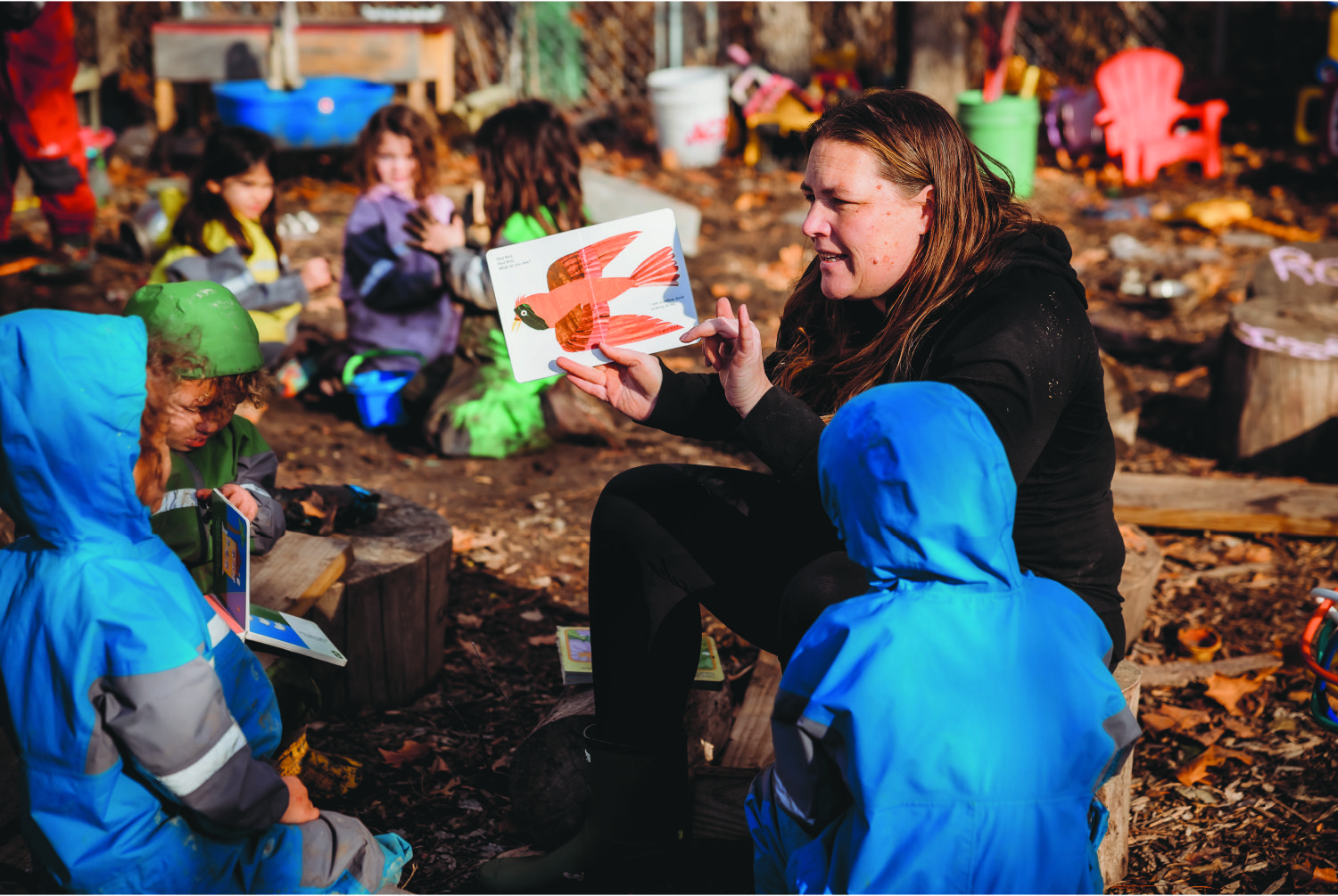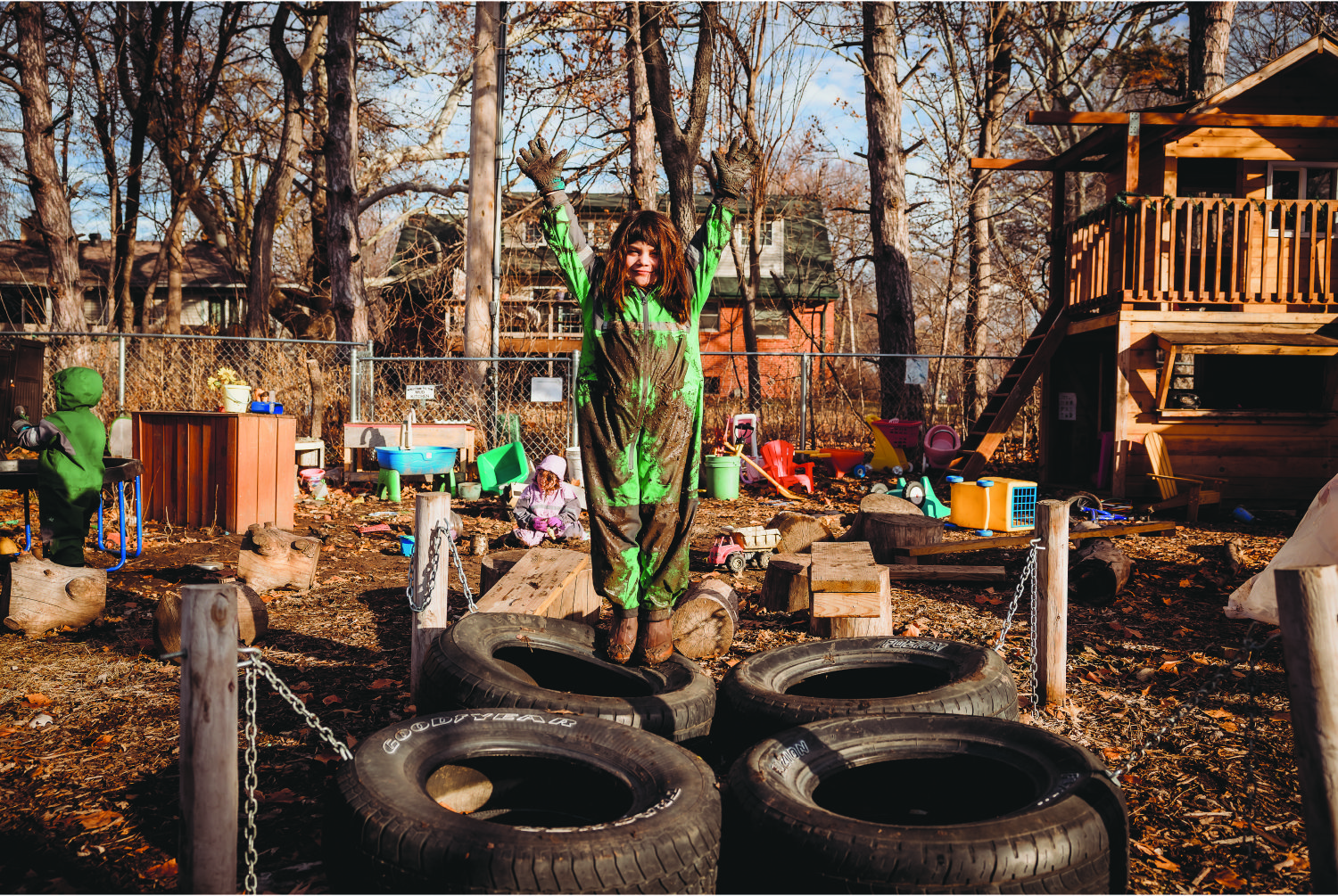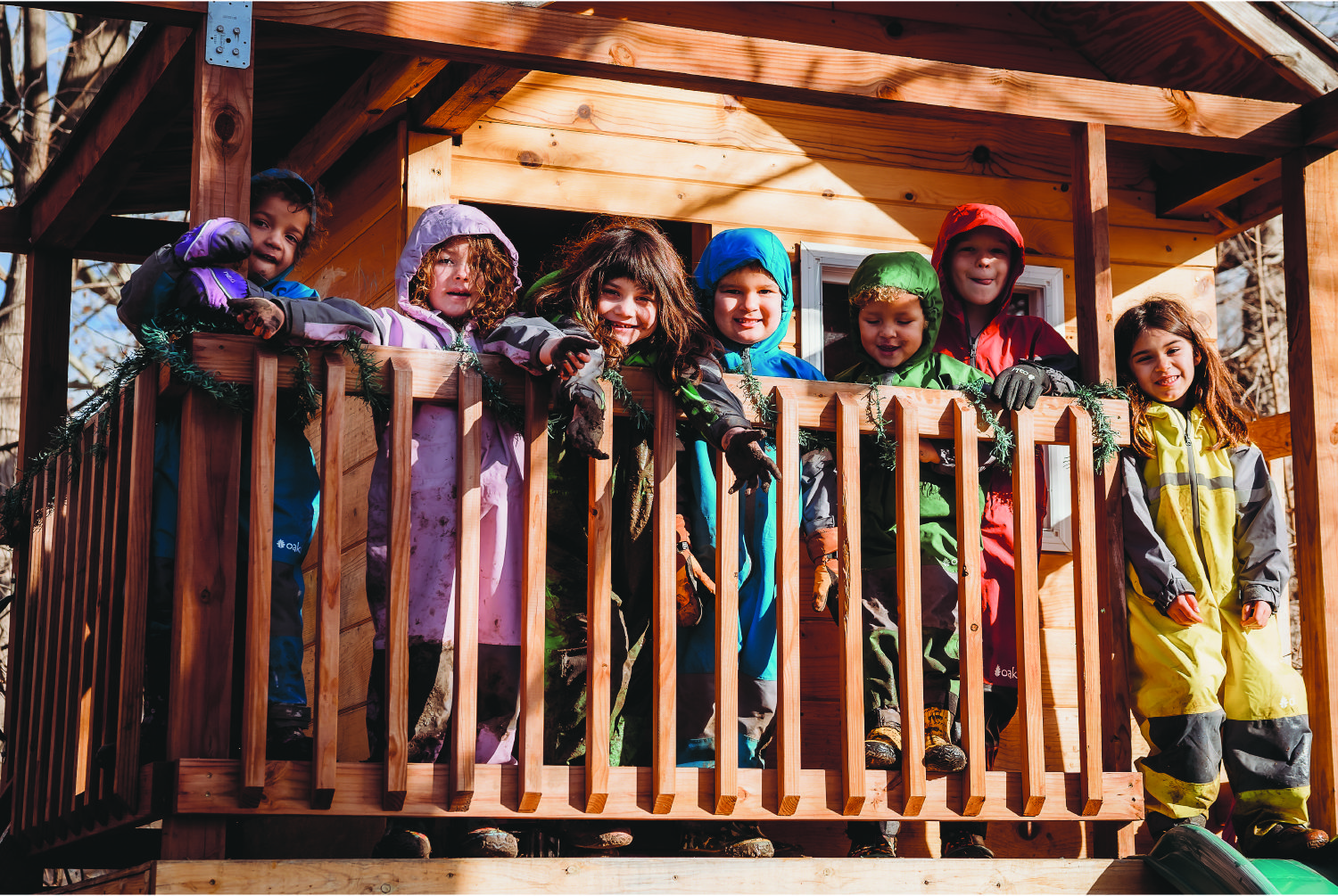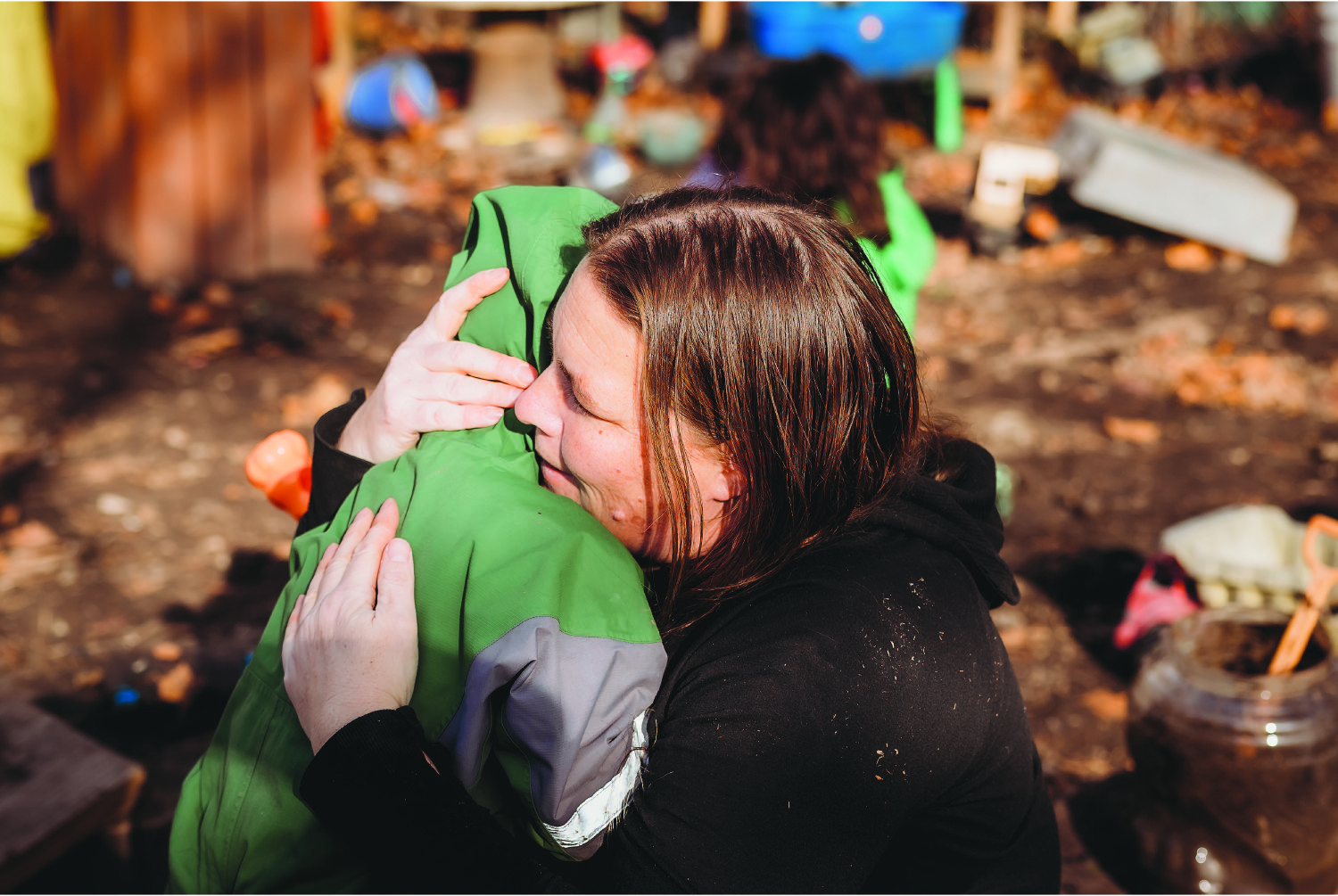
Step Up To Quality Stories
Step 5 spotlight: Shannon Hampson’s unconventional approach to high-quality child care
Meet Shannon Hampson, director of Wild Child Daycare in Lincoln, Nebraska. Shannon knows that quality comes in many forms. To her, quality means boosting children’s skills and learning with lots of outdoor play and real-world experiences. Learn how her Step Up to Quality journey complemented and improved her program.
What inspired you to become an early childhood professional?
I’m the oldest of nine kids — I’ve just always helped. I’m originally from Canada, where I had my first child. Then I came here and had my second. It was a very big change from having a year of paid maternity leave to six weeks. So, I decided to stay home.
I was also helping friends with their kids before and after school. People kept asking me for help, so I just kind of fell into it, but it’s always been my thing to take care of kids. I started providing child care, technically license-exempt, in 2012 and became licensed in 2017 when I bought my own house.
I didn’t initially have the name “Wild Child,” but people kept asking me what the name of my daycare was. It made me realize I do have a daycare, don’t I? I spend a lot of time outside and am very into child-led, free play. People remark that my kids always have a lot of energy, and I realized that, yeah, we are kind of wild. And it’s okay to be wild. Wild isn’t bad, it’s fun and exciting. We like new experiences, and we like to spend time in nature.

Why do you think these new experiences are important?
They support children’s learning. I can tell a child about a firetruck or show them a picture of one, or I can take them to see a real firetruck. Learning hands-on and being able to experience it is a long-lasting memory. Research shows that if you learn something through play, you can retain it much faster than getting that same information from books and paper.
We play in the rain, we jump in puddles, and we play in the snow. We play in my mud kitchen with measuring cups and wooden spoons where they’re doing math, experimenting and mixing colors. All of this is learning, but it’s not on a worksheet. Each family is different, and if they prefer a different teaching style than I have, that’s okay, and it doesn’t change my quality. Some people value worksheets, others value the quality of outdoor play, and some value child-led play — quality comes in a lot of forms. It’s not a checkbox.
What is your child care philosophy?
I strive to follow my slogan: “Learning through experiences: inside, outside, and beyond.” I provide a child-led interest, play-based program that follows what the children are interested in while providing an integrated nature/outdoor-based curriculum. I believe so much in this that I wrote my own curriculum, submitted it to the Nebraska Department of Education and received approval.
I want children to learn about the world they live in, experiencing it with all of their senses and exploring as much as they can. We meet the members of our community from Miss Ali, the librarian at Around Town Storytime, to our dance teacher Miss Kari, to the city employees who help take care of the parks where we play. At the zoo, we learn about the world beyond our city through the animals and staff. We walk to the Capitol to meet their Senator and learn how our government works. We visit beautiful gardens and engage with the volunteers that take amazing care of them. We learn about growing food at the Southern Heights Food Forest. There are so many local places that we can adventure to for experiences that help us become contributing members of society.

How did you learn about Step Up to Quality? Why did you decide to join?
Honestly, I was skeptical of Step Up to Quality when I first learned about it. I said I would never do it. But I serve a lot of families with low income, and the majority of my children receive child care subsidies. I had a couple of families who were getting close to exceeding the income limits and would not qualify for a subsidy, but there was no way they could afford child care on their own. I wanted to join Lincoln Littles to get additional assistance, but the program required having a Step 2 rating from Step Up to Quality. After some encouragement, I decided to go for it despite my reluctance.
Step 1 was just registration, and Step 2 was training — thankfully online. As a family home provider, I can’t afford to close for a day, and my families can’t afford for me to close either.
I thought I might stop there. But I talked to my coaches and other contacts, and they said it’s not that difficult to get a Step 3 rating. I looked into it, and the pay increase was an incentive for me with subsidy families. It would get me much closer to what families without subsidies pay. One of my friends is also a family home provider, and her philosophy is similar to mine, so we teamed up and went through the process together.
It took a lot of time. I think it’s important for people to understand that it’s not something you’ll get through quickly. I spent many hours on paperwork because as a family home provider, I know a lot of things, like our policies and drills, but I don’t necessarily write them down. Getting everything on paper makes me feel more professional, and it also allows me to show the quality of my program, even if I do things differently.
How does it feel to be rated at a Step 5 level?
When I secured a Step 5 rating, it felt like I was able to prove that all quality doesn’t fit in a box, and it strengthened my belief in my program. Whether I would have received a 5 or not, I believe I’m a quality program. And no matter what, there’s always room for improvement.
My family home provider friend and I actually got our results the same day, so we took our kids to a party store, bought balloons and party hats, and they picked out celebration items to take to the park.

In what ways has Step Up to Quality helped boost the quality of your child care practices? What have you learned and implemented?
CLASS being offered as an observation tool for family home providers made a huge difference. CLASS is my style of quality, focusing on the children and interactions with them. I want to prepare the kids in my care for the world, and these are their most important years of learning. If I can equip them with social-emotional skills, coping skills and resilience, that’s going to help them succeed in life. And those skills are built through interactions, experiences, making mistakes and trying again.
Step Up to Quality also helps family home providers remember they’re a small business. When your business is your home, it’s easy to be casual about it. But we’re a small business, and to prove our quality, that includes paperwork. I feel like I’m a real business now. If anyone said I wasn’t a business, I’d laugh, because it’s all documented.
Some providers haven’t written down their philosophy, and even if you have it in your mind or have an idea of how you want to provide care, writing it down formally creates confidence: Yeah, this is me. This is my program.
Did you have a Step Up to Quality coach? How was the experience?
I’ve had several coaches through other programs who all helped prepare me for Step Up to Quality. I also had a Step Up to Quality coach who supported me when I had questions. I would encourage people to use a coach, especially if they are just starting out in the child care profession. They’re there to help you as much or as little as you need, to motivate you and to keep you accountable.

What words of encouragement do you have for providers who are considering joining Step Up to Quality or are still working through the steps?
Don’t be afraid to ask. Don’t be afraid to push a little. And be ready to be a bit uncomfortable. When I did my baseline observation, I cried after getting my results, and I came around to being okay with it. I think it’s important to be prepared to be upset about your observation scores. You have to realize that you won’t get certain points, and you’re not expected to get a perfect score. It doesn’t mean you’re less quality, it means your quality may be different.
I also encourage people to reach out to other providers. If you’re part of another group or have a coach, talk to them about Step Up to Quality. It’s okay to be nervous, it’s okay to be frustrated, and it’s okay to shed a few tears — to me, these are all signs of growth, which is ultimately the goal of Step Up to Quality. Even if you think Step Up to Quality is not for you or it’s unattainable, you can do it. It isn’t easy, but that doesn’t mean it’s not worth it.
And finally, don’t forget that you’re probably already providing quality care, and there’s always room for improvement. I wish I had thought this way at the beginning of my journey — these are just guidelines to help improve my quality.
